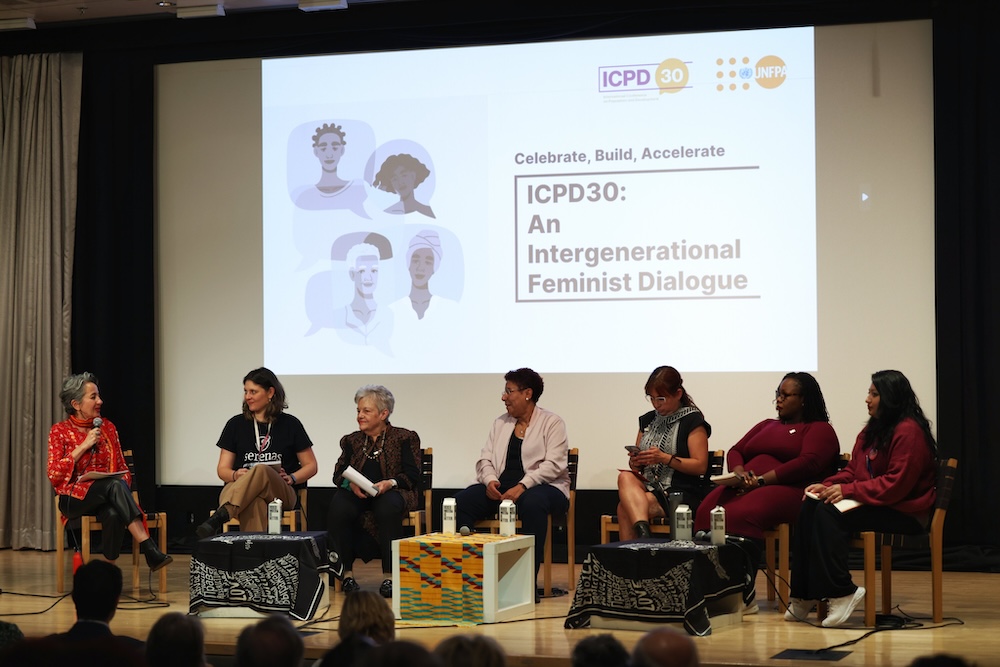Updates
Global conversations build momentum for ICPD30
28 Mar 2024
Updates
28 Mar 2024
As the review of the ICPD Programme of Action speeds ahead, UNFPA is building momentum through a series of global conversations dedicated to civil society organizations and young people to contribute their valuable perspectives to key ICPD topics. By amplifying the voices of individuals at the forefront and those marginalized, these conversations aim to foster an inclusive and impactful review process.
A recent intergenerational feminist dialogue, organized on the sidelines of the 68th session of the Commission on the Status of Women, celebrated the achievements in sexual and reproductive health and rights over the past 30 years and recognized the leadership of young feminists in movements around the world.
The intergenerational feminist dialogue on the sidelines of CSW68 featured a video by Courage Chronicles, presenting filmed oral histories of women who placed sexual and reproductive and health and rights at the centre of governments’ commitments 30 years ago today.
Opening the event, Executive Director Dr. Natalia Kanem said, “Today we celebrate the wisdom of the elders. The courageous, pioneering feminists who changed the world for women and girls, triggering a sea change in thinking about population and development. They shifted the paradigm from a focus on human numbers to a focus on human dignity and human rights, including the right to decide freely whether and when to have children. And as we learn from the past, we look to the future – to the vibrancy and ideas of young feminists.”
She emphasized that intergenerational dialogue revolves around the principles of listening, learning and progress. “It’s about building this big, beautiful, diverse movement and forging ahead – no matter what comes at us. The SRHR agenda is a contested space, and we need to step up and be counted.”
“Feminism is less of a concept now, and more of a way of life” During an animated panel discussion, feminist advocate Leila Hessini delved into a conversation with young leaders about what is at stake and to discuss opportunities to accelerate progress on sexual and reproductive health and rights.
“Sexual rights are human rights that are closest to the soul,” a young feminist said. “We are part of a generation in which women can even choose not to get married. This is a big change in our culture, especially in the African cultural context.”
Panelists discussed how young women today know that they have rights to their own bodies –
not only to be free of violence and harassment, but also to experience pleasure.
They agreed that this might be the most important and enduring legacy of ICPD: Feminism is less of a concept now and more of a way of life for many young women. And there is no going back.
As Dr. Nahid Toubia, Director of the Institute for Reproductive Rights and Health in Sudan, succinctly put it: “Once you put the seed inside of people, it never dies.”

A conversation between Dr. Kanem and Tarana Burke: The power of alliances
During another global conversation in late February, Dr. Kanem and activist and founder of the #MeToo movement Tarana J. Burke, along with UNFPA leaders, convened to discuss the power of alliances as a pathway to accelerate progress on sexual and reproductive rights.
Opening the dialogue, Natalia said: “I am very excited about this session because the topic of alliance-building is so central to the work of UNFPA as we try to galvanize a stronger and broader movement. And that is what we need to keep the flame burning bright 30 years after Cairo.”
To begin, she prompted Tarana to outline the characteristics of a good ally. Tarana said: “The thing that we know about sexual violence is that it doesn't discriminate, but the response to it does. While we may share the same trauma, we may not share the same post-traumatic response.”
She stressed the importance on allies in the fight to eradicate sexual violence understanding how identical experiences can be interpreted diversely within various communities and how they impact individuals' bodies and lives in distinct ways.
“A community problem requires a community response”
Tarana shared that throughout her years of advocacy, she has observed persistent silos between movements, but that in recent years there has been a positive shift. “We are starting to realize across movements that we are fighting the same demons, forms of oppression and oppressors. I have seen more cross-movement collaboration in recent years than I saw in the last 25 years prior to that.”
She suggested that efforts should be focused on nurturing the existing community, rather than attempting to persuade those with entirely opposing views. “I would spend my time on people who have no opinion and people who we are just not reaching, as opposed to people who have told you that they hate you,” she said with laughter.
As Natalia noted that young people today are spearheading and embracing a type of diversity that older generations may not have, Tarana added: “I think that we have to trust the young people and provide guidance.” She knows this from experience: “I was told very early on that I had power and it was a game changer for me.”
Watch the full recording of the Let’s Talk SRHR – The Power of Alliances session organized on 27 February.